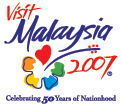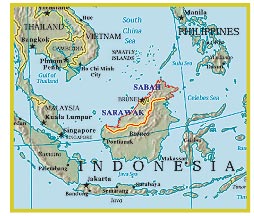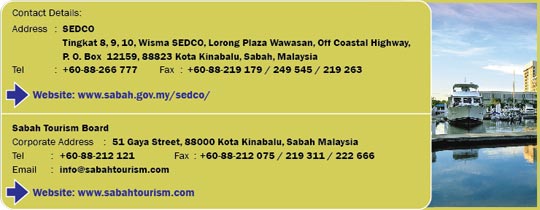SEDCO – Making a different in Sabah
 The City skyline of Sabah’s capital, Kota Kinabalu, belies the startling changes that have taken place in Malaysia’s eastern state nestling in the northeastern tip of Borneo, a region that until the latter half of the past century still evoked images of vast tracts of impenetrable tropical jungles, blowpipe carrying nomadic tribes living in longhouses and living in what the world in general regarded as ÒThe Lost WorldÓ.
The City skyline of Sabah’s capital, Kota Kinabalu, belies the startling changes that have taken place in Malaysia’s eastern state nestling in the northeastern tip of Borneo, a region that until the latter half of the past century still evoked images of vast tracts of impenetrable tropical jungles, blowpipe carrying nomadic tribes living in longhouses and living in what the world in general regarded as ÒThe Lost WorldÓ.
Some 29 thousand square miles in size, nearly two-thirds the size of Peninsular Malaysia, 3.2 million people and separated by 900 miles of the South China Sea from the national capital of Kuala Lumpur, the state provides a unique study of the socio-political challenges of modernisation and economic development in Malaysia.
Just after World War II, Sabah had less than 360 kilometres of sealed roads, 100 km of railways, 600,000 people and a primitive telephone and telegraph system that mainly served the tiny government establishment Jesselton, Sandakan and Kudat. Its capital, Jesselton, was totally devastated by bombing, and no roads linked its major settlements of Sandakan, Tawau, Keningau and Kudat. The state’s economy relied heavily on timber extraction from its fabulously rich and varied tropical rainforests, with almost every other basic need imported at a price from Singapore, Hong Kong or Peninsular Malaysia. Industry as we know it today was non-existent.

Fast forward to 2007. Kota Kinabalu is a bustling modern city of dazzling resorts, shopping malls, sprawling residential estates in the suburbs and rapidly expanding industrial and commercial activities. More than two million tourists arrive each year to enjoy the incredible natural attractions of the state and its colourful cultural variety. Golf is the in-thing at the moment, with a good number of top class designer courses available in all its major towns charging green fees that must be among the lowest anywhere in Asia. Air and sea links, along with modern communications facilities keep the visitor and businessman in constant touch with the rest of the world. This is Sabah today.
The same scenario is played out in the other major towns of the state. Oil and Gas have overtaken timber as a revenue earner for Sabah, and oil palm is the ‘golden crop’ of the times. Sabah is today Malaysia’s major producer of both.
The State Economic Development Corporation, SEDCO, incorporated in 1971, has played a major role in bringing about these exciting changes in Sabah’s development. Born of an idea mooted by Malaysia’s second Prime Minister, the late Tun Abdul Razak Hussein, after the formulation of the New Economic Policy that called for economic development designed to eliminate economic disparities between the indigenous or Bumiputera community and the non-indigenous population, SEDCO was set up under the chairmanship of the then Chief Minister, Tun Datu Mustafa Harun. It was tasked with the twin responsibilities of spearheading the state’s industrialisation program and advancing the development of a Bumiputera Commercial and Industrial Community, BCIC. Thirty-five years on, and SEDCO has a proud track-record in having met both objectives.
With some seventeen companies under its wing, the SEDCO Group has pioneered the manufacture of steel and cement in Sabah. It is still the only manufacturer and major supplier of these two products, so essential to development and industrialisation in the state. SEDCO also pioneered the automotive industry in Sabah in partnership with the peninsula-based Lion Group to assemble and distribute trucks and FWD vehicles in Sabah. Other activities of the Group in manufacturing include paint, fertilisers, flour, concrete products, and tiles.

 In pursuit of its BCIC goals, SEDCO through its subsidiaries the Sabah Urban Development Corporation (SUDC) and Perkasa Realty Sdn. Bhd. has transformed the urban landscape through real estate development that has enabled Bumiputera entrepreneurs and businessmen to acquire business and residential premises and properties in the urban areas. In the rural areas, new townships like Ranau and Siptang owe their development to the efforts of SEDCO. The previously bleak and isolated rural landscape has seen a remarkable transformation from the development of new townships like these, bringing hope and economic opportunities to the rural people who are mainly Bumiputera.
In pursuit of its BCIC goals, SEDCO through its subsidiaries the Sabah Urban Development Corporation (SUDC) and Perkasa Realty Sdn. Bhd. has transformed the urban landscape through real estate development that has enabled Bumiputera entrepreneurs and businessmen to acquire business and residential premises and properties in the urban areas. In the rural areas, new townships like Ranau and Siptang owe their development to the efforts of SEDCO. The previously bleak and isolated rural landscape has seen a remarkable transformation from the development of new townships like these, bringing hope and economic opportunities to the rural people who are mainly Bumiputera.
SEDCO is also involved in tourism-related activity. Sabah’s tourism sector has been growing by leaps and bounds. In the sixties and seventies, small numbers of tourists came to Sabah annually, mainly those with local connections or to enjoy jungle trekking, diving or scaling the famous Mount Kinabalu. Today it is a different picture. More than two million visitors arrive annually, and the numbers keep growing. Ecotourism is the big thing, mountain climbing, jungle trekking, white water rafting and diving. Then there’s the fabulous and affordable golfing on offer, good shopping, excellent convention and meeting facilities and a good choice of accommodation from five-star hotels to backpacker level.
SEDCO’s involvement in the hospitality sector began in the mid-seventies when it built hotels in Tenom, Keningau and Kundasang where quality accommodation was then not available. Even today these establishments under the Perkasa Hotels Group are the main players in the hospitality sector of Sabah’s interior. In Kota Kinabalu itself SEDCO holds majority equity in the five-star Hyatt Regency Kinabalu. The hotels in the Perkasa Group are currently being upgraded and improved while there are plans for new hotels in the east coast towns of Sandakan, Lahad Datu, Semporna and Tawau.
SEDCO’s Bumiputera development agenda has also been pursued with vigor and commitment. Throughout the state hundreds of Bumiputera traders and small businesses have been established, both in the towns and rural areas. Trading premises, shophouses and even residential premises have been provided for Bumiputera entrepreneurs under favourable financial terms. Training in business and commerce is also provided for the Bumiputera community at government expense on a regular basis. Thousands of Bumiputera businessmen and traders who are today a permanent feature in the state’s socio-economic scenario were given a start in business and industry by SEDCO agencies.
The future is equally exciting, and as the state gears itself for the final push towards Vision 2020 and beyond, SEDCO is setting the bar higher by looking to move into new vistas of business and corporate directions. To mention a few, the oil and gas sector, biofuels, biomass, agribusiness, and marine industries. SEDCO is also preparing itself to take a leap of faith into the era of the k-economy by involving itself seriously in ICT with plans to develop Sabah into a regional communications hub to eventually link the Brunei Darussalam Indonesia Malaysia Philippines – East ASEAN Growth Area (BIMP – EAGA) of sixty million people in Sulawesi, Mindanao and Kalimantan to the world.

